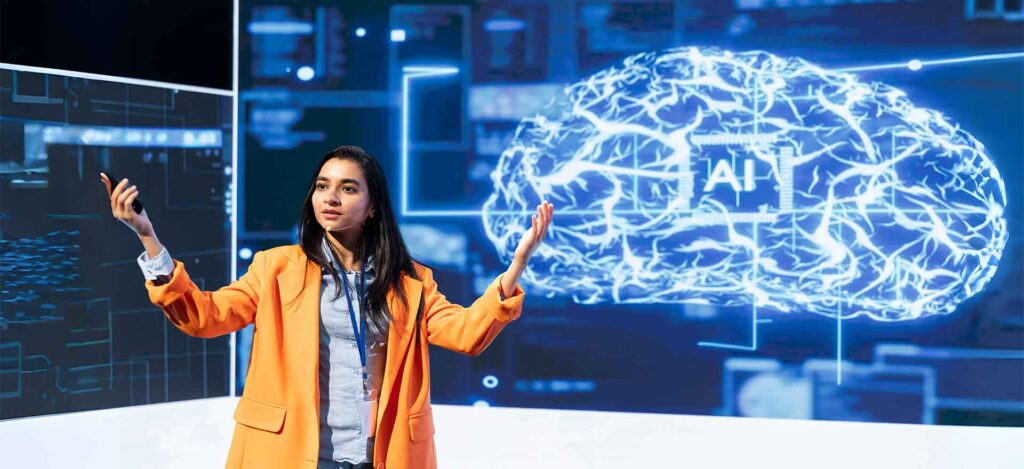Artificial Intelligence (AI) has been changing the world of marketing in terms of innovative characteristics. They offer for customer interaction, streamlining business processes, and improving decision-making. Some of the features of AI that are integrating more into businesses’ and online marketing practices. Now enable them to delve deeper into gaining insight into consumer behavior, automate works, and produce very customized marketing campaigns.
With the technology advancing, a question still looms over our heads. How ai helps in marketing, here are the discoveries of how AI is transforming the face of marketing strategies and some important advantages for it.
AI Strategies in Marketing

-
Data Analysis and Insights
An enormous amount of data can be processed via AI that detects patterns that would be missed by the human eye. AI identifies customer preferences as well as makes futuristic behavior predictions. Which ensure targeting, and effectiveness in campaigns by analyzing customer interactions between different touch points to help marketers make data-driven decisions and optimize strategies.
-
Personalization
Hyper-personalization or generating personalized content or recommendations or offers to an individual depending on a customer’s activity or AI makes preference possible. For example, Products available for a customer through AI algorithms will be based on previous activity or purchases of that customer over the browsing history. Therefore, there will be a better experience for customers and increased conversion rates with AI in digital marketing.
-
Automation
Automation of repetitive work such as sending out emails, posting on social media, or answering customer inquiries. This will enable marketers to spend more time on strategic initiatives. AI chatbots can also help answer queries from customers instantly, improving customer service and satisfaction levels.
-
Predictive Analytics
It forecasts the behavior of consumers in the future after analyzing past data. So also with the help of artificial intelligence, a marketer can learn to forecast sales, predict the value of certain customers, and read future trends. Predictive analytics allows the streamlining of the campaign and the achievement of good results as it anticipates what customers are likely to do next.
-
Content Creation
Tools powered by AI are capable of content generation from blog pieces to social media updates and even video scripts. Hence, tools automate and enhance human endeavors in coming up with great content at scale from a very fine art to well-bestowed high content volume utilization by marketers through AI. A good example of this would be AI-generating email messages as per the user’s preferences, which increases engagement and conversions as a result.
-
Segmenting Customers
AI performs statistical analysis on customer data gathered, it’s able to find segments that contribute to a single audience. This will further help marketers develop their campaigns to meet particular segments perfectly. Thereby improving their targeting accuracy and progress in campaign achievements.
-
Sentiment Analysis
It can analyze customer sentiment using social listening and reviews as well as user-generated content. Marketers will clearly know how customers view their brand and help them make wise choices in their strategies and campaigns. Most importantly, it also provides early warning of anticipated problems so that businesses can deal with them before they escalate.
-
Dynamic Pricing
AI could also create dynamic prices that could derive their value from real-time analysis of market trends, demand, and competition prices. The business would then measure prices according to the current condition of the market, thus optimizing revenue, and maintaining competitiveness.
-
Ad Targeting
Moreover, AI analyzes all user demographic, profile, and behavior data, to give an advanced approach to ad targeting. In programmatic advertising, AI then buys and places ads automatically where these are most likely to meet the right audience requirements. All these improve the performance of the ad with very little ad waste.
-
Customer Journey Mapping
Artificial Intelligence would be tracking and analyzing customer interaction across various touchpoints with sleekness and detail. These map out a gradual path in the customer experience for marketers so that any existing areas for improvement are recognized and ongoing optimizations take place.
Benefits of Using AI in Marketing

-
AI Automate Operations
It has made it possible for efficiency within the sales system by using sophisticated AI. Marketers can increase productivity; the burden of performing repetitive processes falls off their shoulders, ensuring effective campaign execution while flows all processes smoothly.
-
Much Better Customer Experience
With this premise in mind, automated and personalized marketing interactions are expected to give excellent customer satisfaction and loyalty. It can provide also continuous relevant experiences in their profile, creating a better tie with customers.
-
Cost-Effective Alternatives
AI needs no manual labor; reduced marketing wasted costs will make it possible to delivery the maximum result at the least possible cost. By automating several tasks, together with intelligent targeting, businesses can also save marketing budgets that bring and save greater returns.
-
Better Decision Making
Make informed data-driven decisions to profit from valuable predictive analytics and insight obtained from artificial intelligence. Hence, it can ensure that marketing strategies are utilized effectively and adapted quickly to ever-changing market conditions.
-
Scalability
Marketing solutions based on artificial intelligence are automated in their capability to run large-scale campaigns worldwide. Therefore, these tools can assist businesses in expanding operations through various platforms and channels while being effective and consistent as the business expands.
Real-World Examples of AI in Marketing

-
Netflix’s Personalized Recommendations
Netflix engages with user-generated viewing habits through Artificial Intelligence to give a content recommendation. This practice has been proven to massively increase the user engagement and retention for the average person on Netflix. Predicting shows or movies liked by users further enhances the entire user experience.
-
Amazon Product Recommendation
Considering how the company’s using AI in offering personalized product recommendations, which differ from one specific consumer to another, that is browsing or buying history, it took a commendable leap toward increased sales achievement and satisfied consumers that resulted in many purchases at short intervals-namely a higher frequency and value of purchases.
-
Starbucks AI Chatbots
Marketing in the age of AI is a site to witness. What was thought impossible is now at our fingertips. Starbucks integrates AI chatbots to facilitate its customer service. This will thus manage orders and inquiries and minimize waiting times while enhancing relevant customer experience through quick and accurate responses.
Conclusion
AI is about to change marketing in unprecedented fashions. The techniques are targeted at AI-driven strategies that personalize the experiences of the clients to hi-tech and success with the most progressive automation of repetitive tasks to provide some insights for informed decision-making. Marketing has evolved toward intelligent, efficient, and data-informed marketing, and at its center stands AI. The higher it grows, the more its impact on the marketing power now and in the future because it has become a must-have for any keen business striving to stay ahead of the pack and make a long-term competitive difference.




